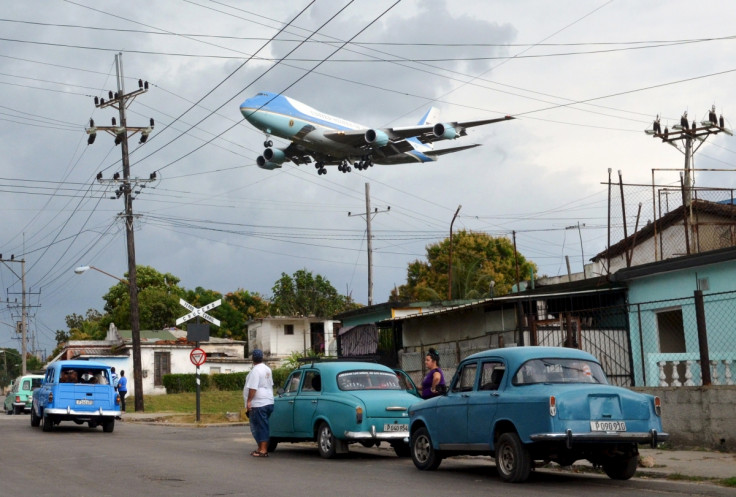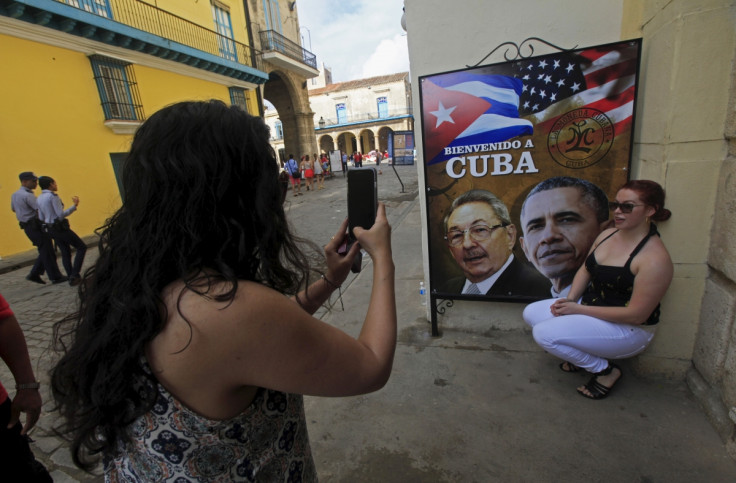Barack Obama in Cuba: Castro clan's totalitarian grip is about to be prised open

It is wise to visit Cuba before expounding on the island's political system. Upon witnessing first-hand Cuban police thuggishly rounding up political 'subversives', you would be less inclined to pull on a Che Guevara T-shirt and laconically extol the benefits of the revolution.
Similarly, the cruel economic embargo so beloved of the American right loses much of its appeal if you've ever walked down the potholed streets of central Havana alongside its ragged and underfed inhabitants. Yes, their wretched poverty is largely a product of the island's inefficient command economy, but the American embargo, which costs Cuba around £1.2bn a year, makes a bad situation considerably worse.
My own political education was expedited on a visit to Cuba in 2006, when by chance I heard what would become Fidel Castro's final public speech as the country's president. The speech was fortunately only a two-hour affair – the Comandante had been known to talk for up to seven hours – and Castro spent most of it attacking 'Yankee imperialism' and 'Bush and Blair' (this was 2006, after all).
Instead of addressing the many problems that were afflicting Cuban society – a broken economy, the constant exodus of the country's youth to American and Europe, the lack of freedom of expression – the leader of the revolution dwelt almost exclusively on the purported crimes of the US. In socialist Cuba, problems did not 'officially' exist, and if they did they were always the fault of its belligerent neighbour in the north.
Cuban sovereignty means freedom from American domination. But it also means the right of Cubans to interfere in their own internal affairs – something denied to them by the Castro dynasty
Despite the illusions of a few useful idiots, Cuban communism has kept its people in a state of squalid servitude for more than half a century. According to Carlos Franqui, a former comrade of Fidel's during the 1959 revolution, Castro imposed on Cuba the punishments he suffered as a boy in a Jesuit school: censure, thought control, discipline and a Spartan mentality.
The most common left-wing misconception about Cuba is that the US drove the revolution into the arms of the Soviet Union through its bellicosity. In reality, Cuba is a dictatorship because the Castro brothers always preferred militarisation to organisation. The Soviet political structure was merely the most effective means of keeping Fidel and Raúl at the top. The job of the Cuban people was to work and take orders. As Che Guevara told the French weekly L'Express in 1963: "Our commitment to the Eastern Bloc was half the fruit of constraint and half the result of choice."
The devil they know
Yet while American policy did not create the Castro dictatorship, it does help to explain its remarkable longevity. Forget the comforting platitudes about Cuba's supposedly wondrous healthcare and education systems (if you've ever used them, you would no longer say that) – a major reason the Castro brothers have been able to cling to power for so long is because, along with Cuba's cheerleaders, they have been able to plausibly blame the US for the revolution's failures. A moribund economy? All the fault of the embargo, comrade. A lack of political freedom? Democracy is impossible with an interfering northern neighbour. Rule for 50 years by the same family? We know best how to confront the empire.
Successive American governments handed the Cuban government this trump card for half a century by pursuing aggressive and imperialist policies which served no purpose beyond appeasing Florida's hard-right Cuban exile community. A prime example of this dull-wittedness was the 1996 Helms-Burton Act, signed into law by Democratic President Bill Clinton. Among other things, the act allowed Cuban-Americans to stake a continued claim on properties that were nationalised by the Cuban government in the early 1960s. The Cuban exile community was thus given carte blanche to descend on Cuba in the event of Fidel Castro's demise and evict thousands of Cuban families from homes they had been living in for half a century.
Is it any wonder, against this backdrop, that many Cubans would rather stick with the devil they know?

Despite the retrospective justifications, punitive policies such as the American economic embargo of Cuba were never a response to human-rights abuses. Rather, they were introduced at the behest of American corporations upset at the loss of their Cuban outposts. Cuba nationalised things and American got angry about it. There are – and were in the 1960s - far worse human-rights abusers in the world than Cuba – countries that the US has never sought to cripple with draconian sanctions. The people of Cuba should also have the right to pursue whichever economic system best serves their interests.
President Obama's radical new approach to Cuba, culminating this week in the first visit to Cuba by a sitting American president since Calvin Coolidge in 1928, should therefore be welcomed – especially by those who hope to see democracy blossom on the island.
Nobody in the west should be under any illusions about Cuba. On his visit, Obama will see the stage-managed Cuba rather than the destitute reality. He will be feted by the country's unelected leaders while peaceful Cuban dissidents – spanning the entire political spectrum from the radical left to the hard right – are arbitrarily detained lest they try to spoil the carefully choreographed charade.
The United States has behaved abominably towards Cuba
Raúl Castro, always the hard-liner in the Cuban administration, has not undergone some sort of Damascene conversion since he became President in 2010. Rather, as a Cuban friend told me in Havana last year, Raúl hopes to create an 'enlightened despotism' comparable to the political systems in China or Vietnam. For all the talk of 'opening up', government repression of political dissent actually increased in Cuba last year.
The mistake on the part of the American right – the Republican establishment wants to ramp up sanctions on Cuba – is to view this as a sign of strength on the part of the Cuban government.
In reality it betrays weakness. Raúl Castro is desperately trying to keep a lid on expectations unleashed by economic reforms and facilitated by a US president who, unlike the belligerents of the past, is not trying to murder the country's political leaders.
In Nineteen Eighty-Four, Winston Smith learned the power of double-think – the holding of two contradictory beliefs in one's mind simultaneously.
With respect to Cuba, the holding of two apparently contradictory viewpoints is essential to understanding the island's politics. The US has behaved abominably towards Cuba, but the repression of the Castro dictatorship follows a logic of its own. Cuban sovereignty means freedom from American domination. But it also means the right of Cubans to interfere in their own internal affairs – something denied to them by the Castro dynasty.
The surest way to hasten the demise of Cuban Stalinism is to take away the Hobson's choice presented to the Cuban people by the government. If Obama gets his way, the Castros will no longer be able to deploy their failsafe get-out clause: 'stick with us or go back to Yankee domination'.
James Bloodworth is a London-based journalist and IBTimes UK columnist. His book, The Myth of Meritocracy: Why Working-Class Kids Still Get Working-Class Jobs, is out on 5 May 2016.
© Copyright IBTimes 2024. All rights reserved.






